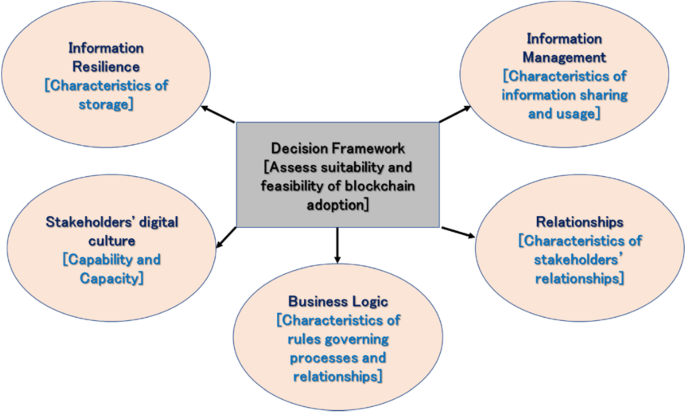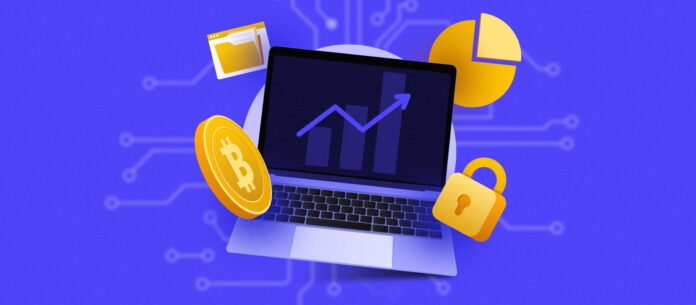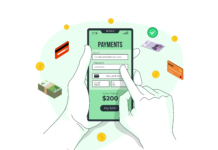As blockchain technology rapidly transforms different industries across the globe, the same is taking place in the financial sector in the Gulf region. Blockchain is a critical part of the digital transformation of nations such as the UAE where it is helping to redesign the way financial operations are conducted, ensuring security, transparency, and efficiency. Blockchain is playing a huge role in Gulf finance from cryptocurrencies to decentralized finance (DeFi) and is creating a future and robust financial system and we will discuss its impact on Gulf finance, its involvement in crypto business in the Middle East and the way Fintech in Dubai is evolving with the innovations of blockchain.
Understanding Blockchain Technology
Blockchain is a decentralized digital ledger that records transactions across multiple computers, making it secure, transparent, and immutable. Unlike traditional financial systems that rely on centralized authorities like banks, blockchain enables peer-to-peer transactions with enhanced security.
Key features of blockchain technology include:
✔ Decentralization – The network does not have any single entity that is in control of the network.
✔ Transparency – All transactions are visible and verifiable.
Sec✔urity –Cryptographic encryption prevents fraud and cyber threats.
✔ Efficiency –and automated transactions reduce processing time and costs.
The Role of Blockchain in Gulf Finance
Blockchain has been adopted by the financial sector in the GCC countries, especially by the UAE and Saudi Arabia. From digital payment to smart contract, governments and financial institutions are using blockchain for different applications.
1. Enhancing Financial Security and Transparency
The biggest advantage of blockchain in Gulf finance is its ability to provide higher security and transparency. As cyber threats and financial frauds are on the rise, blockchain guarantees all transactions are encrypted and immutable, which almost impossible for records to be altered or fraud committed.
2. Digital Banking and Payments
In the Gulf, banks and fintech companies are increasingly bringing blockchain into their system to provide seamless digital banking and payment solutions. For instance, the Dubai Fintech is applying the blockchain technology to make cross border payments cheaper by reducing transaction cost and processing times.
3. Smart Contracts for Automated Transactions
Smart contracts, which are self-executing agreements coded on the blockchain, are transforming the Gulf’s financial sector. They eliminate the need for intermediaries, reducing administrative costs and increasing efficiency. This is particularly beneficial for trade finance and real estate transactions.
4. Cryptocurrency Adoption in the Middle East
Meanwhile, the UAE is leading the charge in crypto business in the Middle East. The legal recognition of cryptocurrency trading and blockchain products are also growing, with Dubai’s Virtual Assets Regulatory Authority (VARA) being one such example. Nowadays, many businesses and investors are taking crypto assets into consideration as part of their portfolios.
5. Blockchain-Based Stock Trading
The Gulf stock exchanges are looking into blockchain for faster and more secure trading. Through blockchain, stock transactions can be settled instantly and reducing the risk of fraud and manipulation. Blockchain is already being used in the UAE’s stock markets to improve the market efficiency.
Blockchain UAE: Government Initiatives and Regulations
The UAE government has been a big supporter of blockchain adoption. To further digitize 50 percent of government transactions through blockchain, it launched the Emirates Blockchain Strategy 2021. Some key initiatives include:
✔ Dubai Blockchain Strategy – Its aim is to turn Dubai into a global blockchain hub.
✔ UAE Pass – a national digital identity system based on blockchain.
✔ Blockchain– Healthcare and Supply Chain Solutions – Used for data security and efficiency. The UAE has laid down a clear legal framework for regulating crypto business in the Middle East to protect investors and maintain financial stability.
The Future of Blockchain in Gulf Finance
As Fintech is advancing rapidly in Dubai and around the Gulf, there seems to be a promising future for blockchain. The future will be shaped by the following key trends:
✔ Central Bank Digital Currencies (CBDCs) – As Fintech is advancing rapidly in Dubai and around the Gulf, there seems to be a promising future for blockchain. The future will be shaped by the following key trends:
✔ Decentralized Finance (DeFi) – More financial services will shift to blockchain-based decentralized platforms.
✔ Blockchain for KYC and AML Compliance – Banks will use blockchain to enhance security in Know Your Customer (KYC) and Anti-Money Laundering (AML) processes.
✔ Tokenization of Assets – Real estate, gold, and stocks will be tokenized on blockchain platforms for fractional ownership.

How Blockchain Is Revolutionizing the Gulf’s Financial Sector
The second part of this section will explore how blockchain is changing the financial operations in the Gulf region. It will show the main advantages of blockchain technology (security, transparency and efficiency), and describes how the major financial institutions start to adopt blockchain technology.
Read This Article: Complete guide on Modern vs Traditional Hotels Interior Designs in Dubai
The Rise of Crypto Business in the Middle East: Trends and Challenges
This part will highlight the rise of cryptocurrencies in the Middle East in general, and in the UAE and Saudi Arabia in particular. It would cover regulatory developments, market trends and challenges faced by businesses and investors in crypto adoption.
Fintech in Dubai: How Blockchain Is Driving Financial Innovation
Dubai is a leading fintech hub in the Gulf and blockchain is an important part of fintech innovation here. In this section, we will see how fintech companies in Dubai are employing blockchain in digital banking, payments, and the decentralized finance (DeFi).
Government Initiatives for Blockchain Adoption in the UAE
Several blockchain initiatives have been launched by the UAE government to facilitate the digital transformation. We will discuss in this section projects such as Emirates Blockchain Strategy, Dubai Blockchain Strategy and regulations for virtual assets and cryptocurrency.
Future of Blockchain in Gulf Finance: Key Trends to Watch
In the latter part of this, we would look at how blockchain trends in the Gulf’s financial sectors will look, especially, Central Bank Digital Currencies (CBDCs), decentralized finance, blockchain based stock trading and tokenization of assets.
How Businesses and Investors Can Leverage Blockchain in the Gulf
The final section will provide practical guidance for businesses and investors interested in applying blockchain in the Gulf. This course will discuss investment opportunities, regulatory compliance and strategies for using Blockchain in financial operations.
Introduction to Blockchain and Its Relevance in Gulf Finance
The blockchain as a transformative technology in the financial sector is introduced in this section. It will explain what blockchain is, how it works, and why Gulf countries are in the process of adopting it for its financial application. This will also put the stage for a discussion of how it impacts banking, fintech, and cryptocurrency businesses.
How Blockchain Is Transforming Banking and Payments in the UAE
The focus of this part is to explain how blockchain is changing the face of banking and payment systems in the UAE. In it, we will touch upon blockchain based digital banking, secure and transparent transactions and how banks are taking advantage of smart contracts to increase their efficiency. A section of the article will also discuss how blockchain minimizes transaction costs and processing times in cross-border payments.
The Role of Blockchain in Crypto Business in the Middle Eeas
The UAE and the Middle East has become the hub for cryptocurrency businesses. In this section we will discuss how blockchain is facilitating secure and transparent crypto transactions, the role of exchanges, and the government efforts to regulate digital assets. Moreover, it will also discuss how businesses and investors are getting into the crypto space that is backed by the framework of blockchain, it will be decentralized and secure.
Fintech in Dubai: Blockchain’s Role in Financial Innovation
Blockchain is an integral part of Dubai’s fintech transformation and positioning itself as a global fintech leader. The next part will discuss how blockchain is incorporated into fintech solutions such as decentralized finance (DeFi), peer-to-peer lending, and blockchain remittance services. Dubai is seeking to become a fintech hub through blockchain driven financial innovations, and it will also discuss them.
Government Initiatives and Regulations Supporting Blockchain in the Gulf
However, this is where Gulf governments are taking important steps to implement blockchain friendly policies so that blockchain adoption can be achieved with the strong backing of the regulatory regime. UAE Blockchain Strategy 2021, Dubai’s Virtual Assets Regulatory Authority (VARA) and other blockchain based such as blockchain based digital identities are covered in this section. In addition, it will explain how Gulf countries are planning to make blockchain and cryptocurrency businesses work in a regulated environment.
Challenges and Risks of Blockchain Adoption in Gulf Finance
Adoption of blockchain has its advantages, but also challenges. In this section we will be discussing regulatory uncertainty, cybersecurity threats and lack of qualified blockchain professionals as obstacles. It will also touch on concerns regarding energy consumption (for blockchain mining) and reluctance of the traditional financial institutions to adopt decentralized technologies.

Future Trends: How Blockchain Will Shape the Financial Industry in the Gulf
Blockchain technology is a constantly changing medium, and this section will take a glance at the major trends that will shape the future of blockchain technology in Gulf finance. In this, it will talk about Central Bank Digital Currency (CBDC), blockchain based stock trading, tokenization of real world assets and combining AI with blockchain for smarter financial solutions. In addition, it will also forecast the effects of blockchain on the Gulf financial markets over the next decade.
Why Blockchain Is the Future of Gulf Finance
In the final section, the key points mentioned in the blog will be summarized, and it will be reiterated that the blockchain is a game changer for Gulf finance. This will focus to discuss how blockchain adds more transparency, security, and efficiency and how it provides a new avenue for digital banking, crypto investments, and fintech solutions. This will also conclude with an importance of regulatory frameworks and investment on blockchain technology to fuel its usage in the Gulf region.
Blockchain Uae: Transforming the Financial Landscape
In this section we will talk about how blockchain technology is changing the UAE’s financial sector. It will discuss how it will help in boosting security, reducing transaction costs and increasing transparency in banking, payments and investment sectors.
The Rise of Crypto Business in the Middle East
This section will focus on the increased adoption of cryptocurrency in the Middle East, blockchain in supporting digital assets, government regulations and the role of crypto exchanges in Dubai and other Gulf countries.
Fintech in Dubai: Blockchain’s Role in Financial Innovation
In this part, Dubai’s fintech ecosystem and the role of blockchain in digital banking, smart contracts, and decentralized finance (DeFi) innovations will be highlighted. It will also analyze the UAE’s strategy to become a global fintech hub.
Future of Blockchain in Gulf Finance: Opportunities and Challenges
In this section, I will focus on the potential of blockchain in the Gulf’s financial sector, such as upcoming trends in the Central Bank Digital Currencies (CBDCs) and tokenization. It will also cover some regulatory concerns, cybersecurity risks, and a shortage of skilled professionals.
The Rise of Crypto Business in the Middle East
The Gulf has become one of the top destinations for cryptocurrency. In this section we will explore how crypto business in the Middle East is expanding, with the UAE fronting in crypto regulations, blockchain based exchanges and digital asset investment. In addition, it will talk about Dubai’s Virtual Assets Regulatory Authority (VARA) and how businesses and investors have been taking to cryptocurrencies.
Conclusion
It is undeniable that blockchain has an impact on gulf finance. In the Middle Eastern crypto business, blockchain is a revolution for the financial landscape with better security, efficiency and innovation. With Blockchain UAE initiatives gaining momentum, we can be certain of a more digitized and transparent financial ecosystem in the Gulf.
The Gulf has adopted blockchain not because it is a trend, but because it is the future of finance. Blockchain will continue to be the next generation of financial services in the region only with continued government support and technological advancements.










